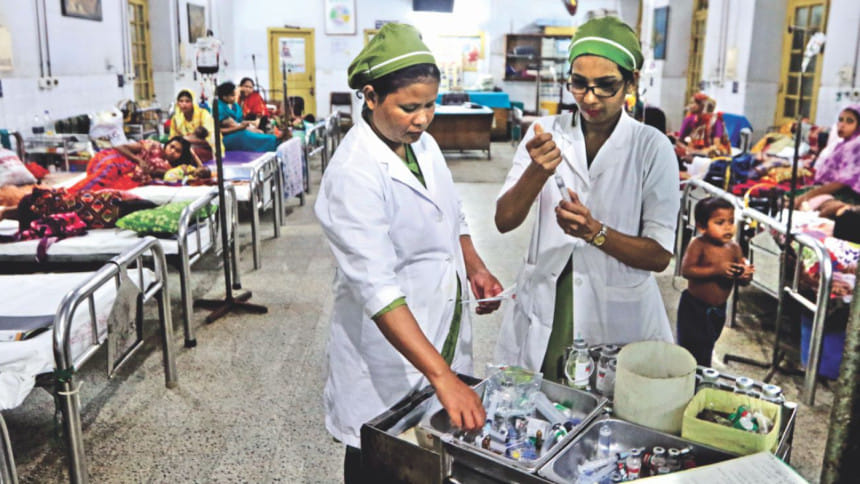Another kind of sacrifice

Location: Department of Paediatric Surgery, ward 205 at Dhaka Medical College Hospital (DMCH). Day: August 21, the eve of Eid-ul-Azha. Time: 9:30pm.
Lima Rangsa, one of the two nurses who were on night shift duty (8:00pm-8:00am), had her hands full, checking up on the children, and ensuring their medications were being administered on time.
As the rest of the city took last-minute preparations for Eid festivities the next morning, some 28 children admitted at the ward were being taken care of by two nurses and three doctors by turn in three shifts.
Lima also took time to talk to the parents of the children undergoing treatment, boosting their morale and giving them hope that their children would recover soon.
Throughout the Eid vacation, she has been taking care of the children, working a 12-hour shift each day to cover for her colleagues who were on leave to celebrate Eid.
“Those who are non-Muslims have to work during Eid holidays as the Muslim nurses and doctors are on vacation to celebrate the religious festival,” said Lima, an indigenous woman and a Christian, hailing from Birishiri of Netrakona.
Lima is just one of the many non-Muslim nurses and doctors at different private and government hospitals, providing service round the clock to take care of the patients during Eid holidays.
The number of doctors and nurses drop at the hospitals during the festive season, leaving it to those on duty to shoulder the extra responsibility.
Syeda Rina Khanam, a nursing supervisor at DMCH, said this year a total of 362 non-Muslim nurses were on duty along with 11 other staff members.
Usually, around 1,700 nurses are on duty at the hospital on a regular day, she said, adding that their non-Muslim colleagues work day and night during Eid days, letting the Muslim colleagues enjoy their holiday with their families.
Their hard work does not go unnoticed by patients and their attendants, who see their dedication as a selfless act.
“The sisters are looking after my daughter and proving the necessary medication. Their service is good,” said Kamana, whose seven-year old daughter was recuperating after a surgery at DMCH.
Although non-Muslim staffers take helm of the responsibilities at hospitals during Eid, they do not get paid extra for the service. Their service is considered regular daily routine. However, when they have their own religious celebrations, they get holidays and Muslim nurses and doctors work in their place.
Outpatient departments (for treatment of patients who do not need to be admitted for overnight care, commonly known as “outdoor”) of government hospitals remained closed on Eid day, but the emergency departments were open 24 hours as usual. The flow of patients was irregular and unpredictable during the time, but doctors were available to deal with the situation.
“Usually we see 150-200 patients in emergency section on a regular day, but during Eid days, the number doubles,” said on-duty doctor Taposh at Emergency Department of National Institute of Traumatology and Orthopaedic Rehabilitation (Nitor).
Since many smaller clinics are closed on Eid and poor people have nowhere to go, they come to government hospitals, resulting in high number of patients, added Taposh, who is a Hindu.
Government hospitals arrange for special foods on Eid day so that patients can experience the festivity and feel at home. Besides, clean bed sheets are provided for them.
“We do not want to keep the patients on old or dirty bed sheets. We try our best to keep them clean,” said China Bhoumik, a Hindu nursing supervisor at Nitor.
Around 50 nurses were working during Eid, out of around 278, to serve about 400 patients at Nitor, she said.
Sukumar Chandra Biswas, a Hindu senior staff nurse of Shaheed Suhrawardy Medical College Hospital (SSMCH), has been in the profession for 14 years. “We have to work during Eid days and we consider it our duty,” he said.
Reiterating him, Ruly Halsana, a Christian senior staff nurse of SSMCH, said, “The extra work we do during Eid is a service to humanity.”

 For all latest news, follow The Daily Star's Google News channel.
For all latest news, follow The Daily Star's Google News channel. 



Comments